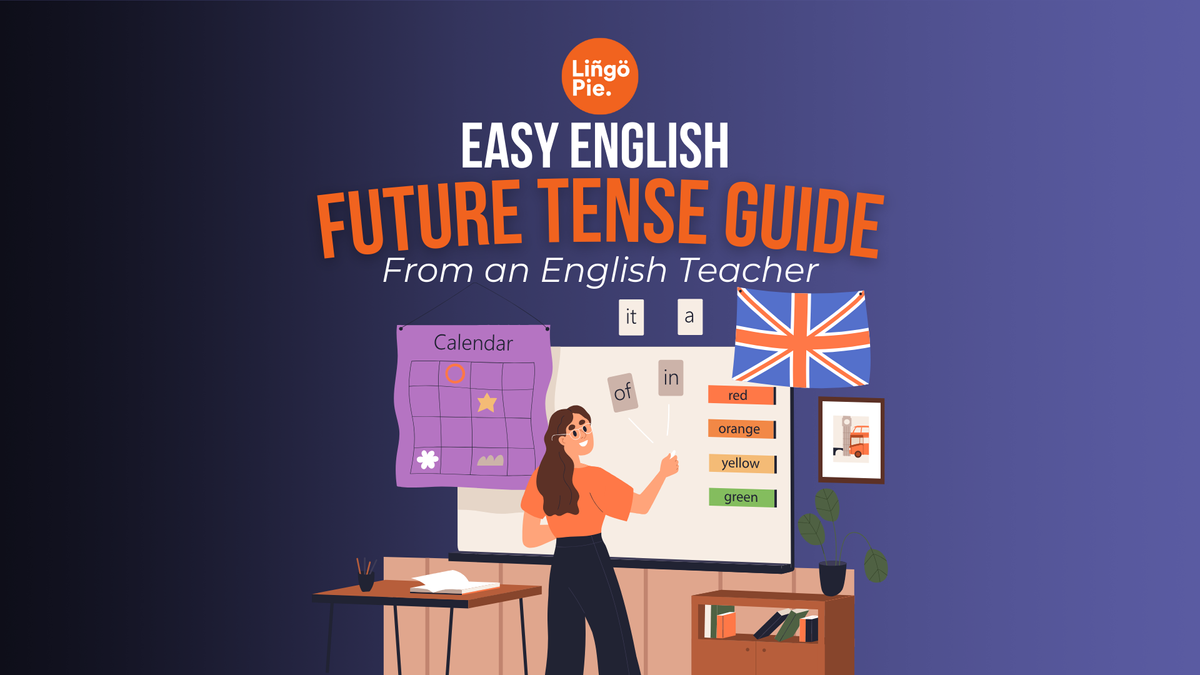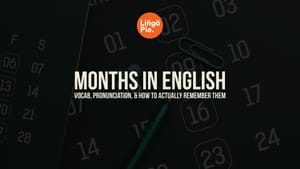Future tenses have always been a trouble for English learners because there are too many patterns and usages to talk about the future. But in this guide, I explain everything about the English future tense in an easy-to-understand way as an English language teacher.

What is the English Future Tense?
The future tense is a crucial component of English grammar that enables speakers to express actions, plans, and events that have not yet occurred. Mastering the future tense is essential for effective communication, as it allows individuals to:
- Make predictions about what will happen.
- Discuss plans and intentions.
- Describe scheduled events.
- Express promises and offers.
How Future Tense is Used in English
The future tense is a verb form used to describe actions or events that will happen at a later time.
We use the future tense to:
1. Talk about plans or intentions.
Example: "I will visit my grandparents next weekend."
2. Make predictions.
Example: "It will rain tomorrow."
3. Discuss scheduled events.
Example: "The train leaves at 8 PM."
4. Express promises or offers.
Example: "I will help you with your homework."
What are the Common Challenges Learners Face with Future Tense?
While learning the future tense is important, it also presents several challenges for English learners:
Confusion between "will" and "going to": Many learners struggle to understand when to use "will" versus "going to," as both can refer to future actions.
Complexity of continuous and perfect forms: The future continuous and future perfect tenses can be tricky due to their specific usage contexts and structure.
Irregular verbs: Some verbs have irregular future forms, adding an extra layer of difficulty.
Overgeneralization: Learners might overgeneralize rules, applying them incorrectly in various contexts.
Inconsistent usage: Inconsistent exposure to and practice with different future tense forms can hinder mastery.
Read Also:


Future Tenses In English
1. Present Simple Tense
The present simple tense can be used to talk about scheduled events and timetables. This is common with transportation schedules, public events, and fixed plans.
Transportation Schedules:
- "The train leaves at 6 PM."
- "The bus arrives at 7:30 AM."
Public Events:
- "The concert starts at 8 PM."
- "The movie begins at 5 PM."
Fixed Plans:
- "My class begins at 9 AM tomorrow."
- "The store opens at 10 AM on Mondays."
2. "Will" vs "Going To"
Will
- Used for spontaneous decisions made at the moment of speaking.
- Used for predictions based on personal opinions or experiences.
- Used for promises, offers, and requests
Spontaneous Decisions:
- "I'm thirsty. I will get a glass of water."
- "I forgot to call him. I will do it now."
Predictions (Will):
- "I think it will be a great party."
- "I'm sure she will pass the exam."
Promises, Offers, and Requests:
- "I will help you with your homework."
- "Don't worry, I will take care of it."
Going To
- Used for plans or intentions decided before the moment of speaking.
- Used for predictions based on present evidence or situations.
Plans or Intentions (Going To):
- "I'm going to visit my grandparents next weekend."
- "They are going to move to a new house soon."
Predictions Based on Present Evidence:
- "Look at those clouds! It is going to rain."
- "She is studying hard. She is going to do well on the test."
3. Future Continuous Tense
The future continuous tense is used to describe actions that will be in progress at a specific time in the future. It emphasizes the ongoing nature of the action at that future moment.
Ongoing Actions at a Specific Time:
- "This time tomorrow, I will be traveling to Paris."
- "At 8 PM tonight, she will be studying for her exam."
Planned Future Events:
- "Next week, we will be attending a conference."
- "They will be working on the project all weekend."
Polite Inquiries About Future Plans:
- "Will you be using the car tonight?"
- "Will they be joining us for dinner?"
4. Future Perfect Tense
The future perfect tense is used to describe actions that will be completed by a certain point in the future. It emphasizes that the action will have been finished before or by the specified time.
Completed Actions by a Specific Time:
- "By next Friday, I will have finished my project."
- "She will have graduated by the time you visit."
Actions Completed Before Another Future Event:
- "We will have left the house before the guests arrive."
- "They will have completed the construction before the winter sets in."
Milestones or Achievements:
- "By the end of this year, he will have saved enough money for a new car."
- "You will have read 50 books by the end of the summer."
5. Future Perfect Continuous Tense
The future perfect continuous tense is used to describe actions that will have been ongoing for a certain period of time up to a specific point in the future. It emphasizes the duration of the action until that future moment.
Actions Continuing Up to a Specific Future Time:
- "By next year, I will have been living in this city for ten years."
- "She will have been working at the company for five years by the end of this month."
Duration of Ongoing Activities:
- "By 8 PM, they will have been playing soccer for three hours."
- "We will have been waiting for the bus for 30 minutes by the time it arrives."
Achievements and Experiences:
- "By the time you graduate, you will have been studying for four years."
- "He will have been traveling around the world for a year by next summer."
Common Mistakes Learners Make with Future Tense
Confusing "will" and "going to":
- Incorrect: "I will going to the store tomorrow." ❌
- Correct: "I am going to the store tomorrow." ✅
Using present simple instead of future tense:
- Incorrect: "I go to the party tomorrow." ❌
- Correct: "I will go to the party tomorrow." ✅
Misusing future continuous tense:
- Incorrect: "I will be study at 8 PM." ❌
- Correct: "I will be studying at 8 PM." ✅
Overusing future perfect tense:
- Incorrect: "By tomorrow, I will have finished the book." ❌
- Correct: "I will finish the book tomorrow." ✅
Inconsistent verb forms:
- Incorrect: "She will works late tonight." ❌
- Correct: "She will work late tonight." ✅
Tips to Use Future Tense In English Correctly
Understand the Context:
Determine if you are making a prediction, plan, or discussing a scheduled event to choose the correct future tense.
Practice with Examples:
Regularly practice with sentences using "will," "going to," future continuous, and future perfect tenses.
Pay Attention to Time Expressions:
Use time expressions like "by next week," "in two hours," or "tomorrow" to help decide the correct future tense.
Read and Listen to Native Speakers:
Engage with English media (books, movies, conversations) to see how future tense is naturally used.
Practice Consistency:
Regularly write and speak using future tense forms to build confidence and accuracy.
Read Also:


Final Words
Mastering the future tense is essential for clear and effective communication in English. By understanding the different forms of future tense—present simple, "will," "going to," future continuous, future perfect, and future perfect continuous—learners can accurately express their intentions, plans, and predictions.
While common mistakes can be a hurdle, practicing consistently and paying attention to context will help overcome these challenges. With the right strategies and regular practice, anyone can confidently use the future tense to convey their thoughts about what lies ahead.
Frequently Asked Questions
1. What are the four types of future tense?
The four types of future tense in English are:
- Future Simple (using "will")
- Future Simple (using "going to")
- Future Continuous
- Future Perfect
2. What are 10 future tense examples?
Here are 10 examples of the future tense:
- I will go to the store tomorrow.
- She is going to visit her parents next weekend.
- They will be studying at the library tonight.
- By this time next year, we will have completed our project.
- He is going to start his new job next month.
- We will be watching a movie at 8 PM.
- By the time she arrives, we will have finished dinner.
- They are going to travel to Europe next summer.
- He will have been working here for five years by December.
- Tomorrow morning, the sun will rise at 6 AM.
3. What is the future tense rule?
The future tense rule involves using specific verb forms (like "will," "going to," or future verb forms) to indicate actions, events, or states that will happen after the present moment.
4. How to teach English future tense?
Teaching the future tense can be done effectively by:
- Introducing each future tense form with clear examples.
- Providing contexts where each form is used (predictions, plans, schedules).
- Encouraging practice through exercises, conversations, and writing.
- Correcting common mistakes and reinforcing understanding through repetition.
- Using visuals, timelines, and real-life scenarios to make learning engaging and practical.
Learn English by Watching Movies through Lingopie!
Who says learning English can’t be fun? Grab some popcorn and immerse yourself in English by binge-watching TV shows and movies. That's the mission of Lingopie, making language learning fun and immersive!
Lingopie makes learning a new language fun and effective by using real TV shows, movies, and documentaries. It offers interactive subtitles, so you can click on any word to get an instant translation and pronunciation. If this sounds fun to you, download Lingopie from the App Store or Play Store now and get a FREE 7-day trial!










